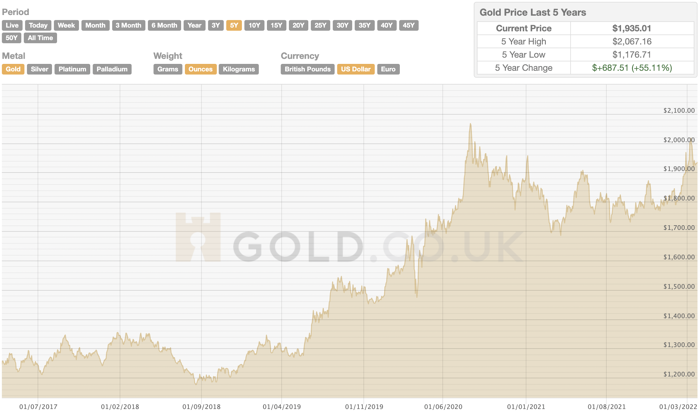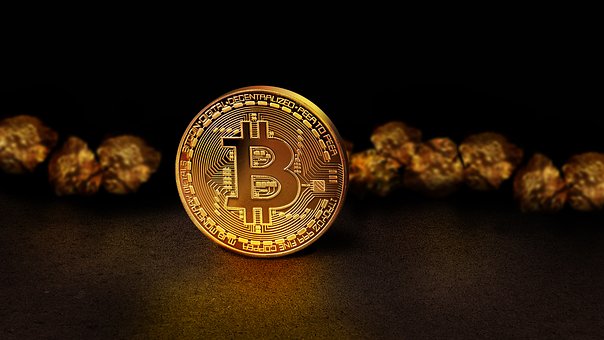
Is Gold the Safest Place to Invest During Times of Widespread Market Uncertainty?
Few could have anticipated the difficulties facing investor portfolios in 2022. Record-breaking levels of inflation on a global scale have been compounded by the ramping up of geopolitical tensions in Eastern Europe has brought a series of strong economic sanctions that have impacted the living costs around the world.
As a result, we’ve seen the performance of gold rise to nearly unprecedented levels, but is the precious metal still the place to go for safe-haven investing?
Trading Derivatives carries a high level of risk to your capital and you should only trade with money you can afford to lose. Trading Derivatives may not be suitable for all investors, so please ensure that you fully understand the risks involved, and seek independent advice if necessary. A Product Disclosure Statement (PDS) can be obtained either from this website or on request from our offices and should be considered before entering into a transaction with us. Raw Spread accounts offer spreads from 0.0 pips with a commission charge of USD $3.50 per 100k traded. Standard account offer spreads from 1 pips with no additional commission charges. Spreads on CFD indices start at 0.4 points. The information on this site is not directed at residents in any country or jurisdiction where such distribution or use would be contrary to local law or regulation.
Gold’s reputation as a safe space to store wealth during times of economic downturns remains unscathed as the commodity continues to outperform other markets in the wake of the recent inflation-driven cost of living squeezes being experienced around the world.

As we can see from the value of gold over the past five years, the commodity has continually rallied in the wake of wider market uncertainty. Although it experienced a similar dip that was felt across the market as the extent of the Covid-19 pandemic became fully known, gold’s recovery was so strong that the asset soared to new all-time highs by the summer of 2020.
Although the asset’s momentum has tapered off in the months that have followed, news of Russia’s invasion of Ukraine prompted more investors to take their money out of traditional stocks and fiat currencies and instead align it with the precious metal.
Compared to just five years ago, the price of gold has grown by some 55.11% in spite of a highly volatile stock market in the wake of factors amounting to inflation, the pandemic, and geopolitical tensions.
Does gold’s recent performance indicate that the asset is the safest place for investors to turn to as the stock market continues to reel from widespread uncertainty? Let’s take a deeper look at what to expect from the archetypal safe haven commodity:
Is Gold a Safe Investment During Times of Geopolitical Conflict?
Despite the value of gold climbing to within $30 USD of its all-time high in the immediate aftermath, Warren Buffett has warned against investors looking to sell off their stocks in order to sit on their liquidity or to invest in assets like gold or bitcoin in response to the outbreak of war. Buffett firmly believes that the best way to navigate these times of uncertainty is to invest in businesses to build wealth over time.
The world-renowned investor and Berkshire Hathaway CEO told CNBC that he had no interest in selling his stocks.
“If stocks are cheaper, I’ll be more likely to be buying them,” Buffett explained. “You’re going to invest your money in something over time. The one thing you could be quite sure of is if we went into some very major war, the value of money would go down.
“I mean, that’s happened in virtually every war that I’m aware of,” he added. “So the last thing you’d want to do is hold money during a war.”
Despite Buffett’s confidence that investing in stocks will provide more growth potential over time, the recent rise of inflation rates has negatively impacted stocks and shares around the world.
The subsequent sell-offs for these stocks have presented the market with a fresh problem that wasn’t present during the 2014 invasion of Ukraine. With this in mind, holding wealth in gold may still be a good choice for investors whilst markets continue to suffer from volatility.

Could Bitcoin Challenge Gold’s Dominance?
Bitcoin has long been heralded as ‘digital gold’ due to its functionality as a more agile store of wealth. After all, BTC can be stored in blockchain wallets and sent and received all around the world almost instantly.
Although it’s seen some exceptional growth during its relatively short lifespan, BTC has struggled in the wake of record-breaking inflation rates – owing to mass investor sell-offs prompted by the cost of living squeeze.
Despite bitcoin’s reputation as a safe haven asset, the cryptocurrency’s well-documented volatility has led to more investors choosing to opt-out of holding the asset during market downturns.
Maxim Manturov, head of investment advice at Freedom Finance Europe, has suggested that the future of bitcoin remains bright as adoption opportunities for the asset continue to grow.
“Cryptocurrency is currently one of the most attractive alternatives to investing in stocks, bonds, and commodities. Cryptocurrencies are generally highly volatile, which means investors can generate high returns. Yet, with volatility come greater risks,” Manturov noted.
“You no longer need a crypto wallet in order to trade cryptocurrencies. In 2021, large funds have started rolling out ETFs with direct or indirect links to crypto assets. Some of the largest and most popular Crypto ETFs include ProShares Bitcoin Strategy ETF, Grayscale Bitcoin Trust (GBTC), Amplify Transformational Data Sharing ETF (BLOK) and Grayscale Ethereum Trust (ETHE).”
Today, cryptocurrencies like BTC carry plenty of potential, and their respective ETFs are set to open up unprecedented investing opportunities without the need for investors to immerse themselves into the crypto landscape.
Although this may point to a bright future for bitcoin, gold’s outperformance in 2022 ensures that it remains a relatively safe bet during these jittery times for global markets. Until we see more confidence returning, it’s likely that bullion will remain a tried and tested safe haven asset.
© 2022 LeackStat.com
